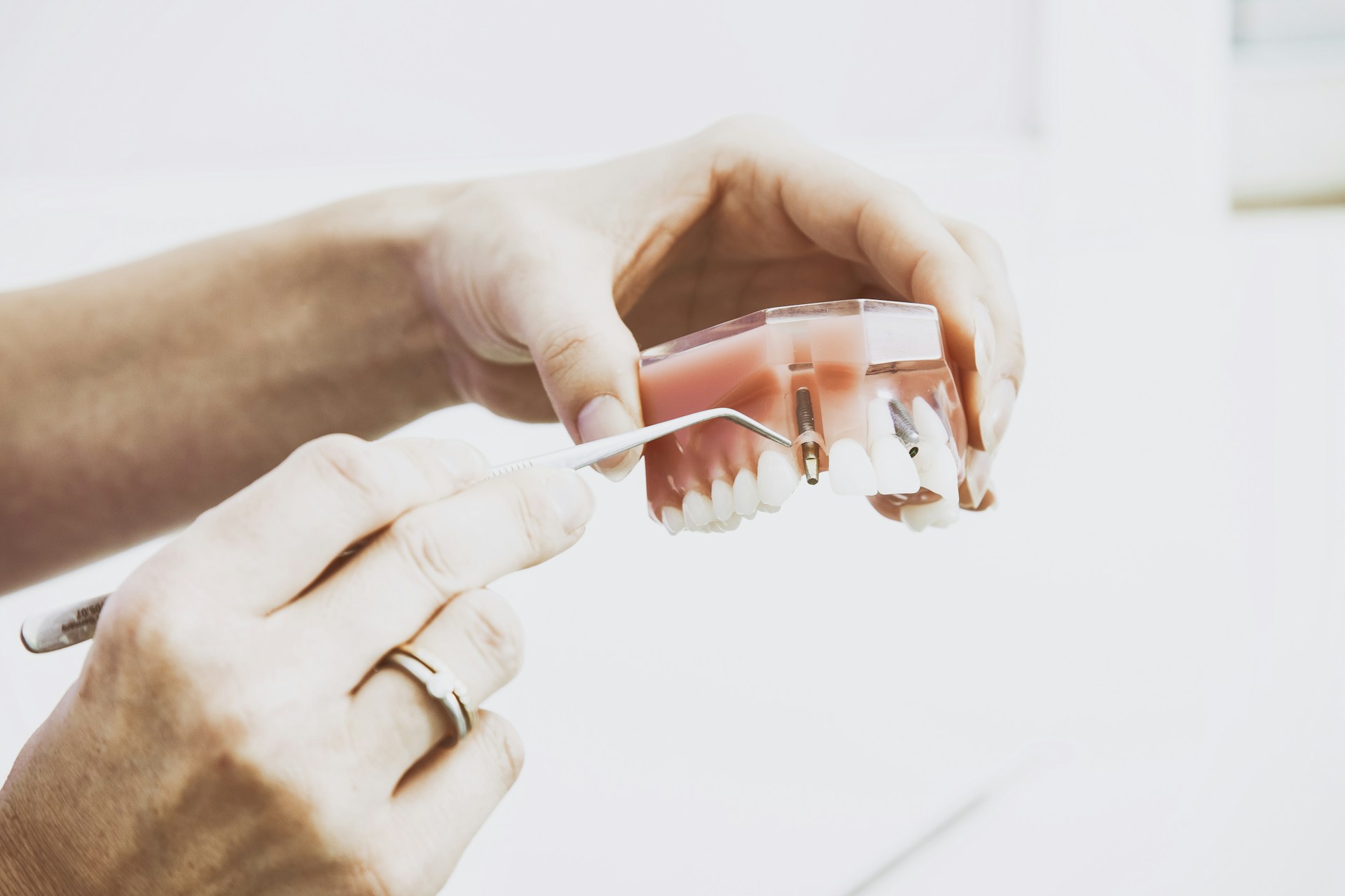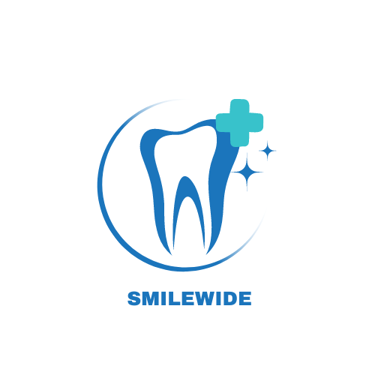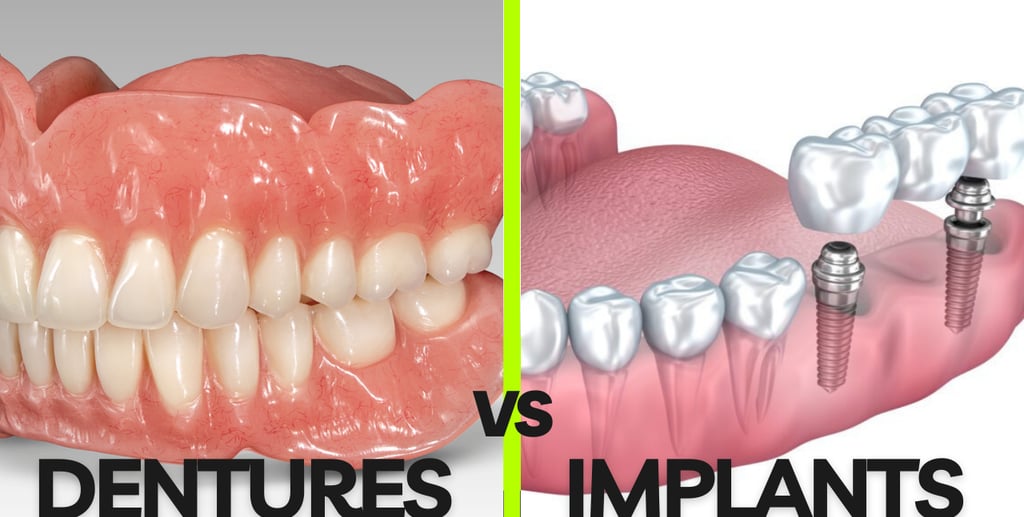SMILE- It costs nothing !!!
Dental Implants vs Dentures: Choosing the Best Tooth Replacement Option
Explore the advantages of dental implants and dentures to find the most suitable solution for restoring your smile. Consult our dental experts for personalized advice on tooth replacement options.
5/27/20246 min read
Dental Implants vs Dentures
When it comes to replacing missing teeth, individuals are often faced with two primary options: dental implants and dentures.
Each option has its own set of characteristics, benefits, and considerations. Understanding these can help individuals make an informed decision that best suits their specific needs and lifestyle.
Dental implants are metal posts that are surgically positioned into the jawbone beneath the gums. These posts act as a sturdy foundation for attaching artificial teeth, which can be custom-made to match the natural teeth in color and shape.
Because they are anchored directly into the jawbone, dental implants provide a stable and permanent solution for tooth replacement.
This method is particularly beneficial for those looking for a long-term fix that mimics the function and appearance of natural teeth.
On the other hand, dentures are removable replacements for missing teeth and surrounding tissues. They come in two main types: complete dentures, which are used when all teeth are missing, and partial dentures, which are used when some natural teeth remain.
Dentures are designed to be taken out and put back into the mouth with ease, making them a flexible option for those who might not want a permanent fixture.
This blog post aims to provide a comprehensive comparative analysis of dental implants and dentures.
By delving into the pros and cons of each option, as well as the lifestyle considerations and cost implications, we hope to assist readers in making an educated decision about which tooth replacement option might be right for them.
Whether you are weighing the durability of dental implants or the convenience of dentures, this guide will offer valuable insights to help you choose the best solution for your dental needs.
RELATED : DENTAL BRIDGES
Advantages of Dental Implants
When considering options for tooth replacement, dental implants offer numerous advantages that make them a preferred choice for many patients.
One of the primary benefits of dental implants is their exceptional durability and longevity. Unlike other tooth replacement options, dental implants can last a lifetime when properly cared for.
This is largely due to the materials used, typically titanium, which integrates seamlessly with the jawbone in a process known as osseointegration.
Another significant advantage of dental implants is their natural look and feel. Because they are designed to mimic the structure of a natural tooth, implants provide a stable and secure fit that enhances both functionality and aesthetics.
Patients often report that their implants feel just like their natural teeth, allowing them to eat, speak, and smile with confidence.
In addition to their durability and natural appearance, dental implants play a crucial role in preserving jawbone integrity.
Unlike dentures, which can exacerbate bone loss over time, dental implants help to maintain the bone.
By stimulating the jawbone through everyday activities such as chewing, implants prevent the bone from deteriorating, which can occur when teeth are missing.
This is essential for maintaining facial structure and preventing the sunken appearance that can result from bone loss.
The stability of dental implants also sets them apart from other tooth replacement options. Unlike dentures, which may shift or slip, implants are securely anchored in the jawbone, providing a reliable and stable foundation.
This stability is particularly beneficial for patients who lead active lifestyles or those who have concerns about the fit and function of traditional dentures.
Expert opinions and patient testimonials further underscore the advantages of dental implants.
Dental professionals consistently recommend implants for their long-term benefits and superior performance. Patients frequently express satisfaction with their implants, highlighting improvements in their quality of life and overall dental health.
Advantages of Dentures
Dentures offer a multitude of benefits, making them a popular choice for individuals seeking tooth replacement solutions.
One of the primary advantages is their non-invasive nature. Unlike dental implants, which require surgical procedures, dentures do not necessitate any invasive surgery.
This makes them an attractive option for patients who may have health concerns or prefer to avoid surgical interventions.
In addition to being non-invasive, dentures are often more economical, particularly in the short term. The initial cost of dentures is generally lower than that of dental implants, making them an affordable option for many individuals. This cost-effectiveness can be especially appealing for those who need to replace multiple teeth, as dentures can accommodate several missing teeth within a single appliance.
Another significant advantage of dentures is their ease of adjustment. Over time, the fit of dentures can be modified to accommodate changes in the mouth's structure, ensuring a secure and comfortable fit.
This adaptability is crucial for long-term wearers, as it allows for adjustments without the need for additional surgical procedures.
Furthermore, dentures are an excellent option for individuals with weaker jawbones.
Dental implants require a certain level of bone density for successful placement, which may not be feasible for everyone.
For those with insufficient jawbone density, dentures provide a viable alternative, offering the functionality and aesthetics of natural teeth without the need for bone grafts or other invasive treatments.
Real-life examples and expert insights further underscore the benefits of dentures. Dr. Jane Smith, a leading prosthodontist, notes that "dentures can significantly improve a patient's quality of life by restoring their ability to eat, speak, and smile with confidence."
Similarly, patient testimonials often highlight the improved functionality and comfort that modern dentures provide, showcasing their effectiveness as a tooth replacement solution.
Disadvantages of Dental Implants
While dental implants offer numerous benefits, it is essential to consider their potential downsides before making a decision.
One of the most significant disadvantages of dental implants is the higher initial cost compared to other dental restoration options like dentures. The expenses not only cover the implants themselves but also the surgical procedures and any necessary preparatory treatments, such as bone grafts.
The necessity of surgical intervention is another critical factor. Dental implant procedures require minor surgery, which may not be suitable for everyone, particularly those with underlying health conditions or those who are apprehensive about undergoing surgery.
The process involves multiple stages, including the initial consultation, surgical placement of the implant, and subsequent follow-up appointments. This time commitment can span several months, taking into account the healing periods required between each stage.
Potential risks associated with dental implants also need to be considered. Like any surgical procedure, there is a risk of infection at the implant site.
Other complications may include nerve damage, sinus problems, or implant failure. Although these risks are relatively low, they are still present and can impact the overall success of the implant.
Additionally, dental implants require a certain level of bone density to be successful. Patients with insufficient bone mass may need additional procedures like bone grafting to build up the jawbone, further increasing the cost, complexity, and duration of the treatment process.
This requirement makes dental implants less viable for some individuals, particularly those with significant bone loss due to prolonged tooth absence or severe periodontal disease.
Considering these factors is crucial when evaluating dental implants as a tooth replacement option. The higher initial investment, surgical risks, time commitment, and prerequisite bone density can be significant barriers for some patients, making it important to weigh these drawbacks against the benefits to determine the best course of action for individual dental health needs.
Disadvantages of Dentures
Dentures, while a common solution for missing teeth, come with a set of disadvantages that may affect their overall suitability for some individuals.
One of the primary concerns is their stability and comfort. Unlike dental implants, dentures can feel less secure in the mouth. They may slip or shift, particularly during activities such as eating or speaking, leading to discomfort and potential sore spots on the gums.
This instability can make daily activities more challenging and less enjoyable.
Another noteworthy drawback is the need for regular adjustments and replacements. As the structure of the mouth changes over time, dentures may no longer fit as well as they initially did, necessitating periodic adjustments or even complete replacements to ensure a proper fit.
This ongoing maintenance can be both time-consuming and costly, adding to the long-term burden of denture wear.
Maintenance of dentures also requires a meticulous daily routine. Users must clean their dentures thoroughly each day and soak them overnight to prevent bacterial buildup and staining.
This care regimen, while essential for oral health, can be seen as cumbersome by some, especially when compared to the relatively low maintenance needs of dental implants.
Additionally, dentures can impact speech and eating. Some wearers may experience difficulty pronouncing certain words or sounds, leading to self-consciousness and frustration.
Chewing efficiency can also be compromised, making it harder to enjoy a variety of foods. These issues can significantly affect one's quality of life, contributing to reduced self-esteem and confidence.
Overall, while dentures are a viable option for tooth replacement, their disadvantages in terms of stability, maintenance, and impact on daily activities should be carefully considered. Individuals should weigh these factors against the benefits to determine the best course of action for their dental health and overall well-being.
In weighing the pros and cons of dental implants versus dentures, individuals must consider their unique needs, lifestyle, and budget.
Dental implants offer a more permanent and natural-feeling solution, potentially providing better long-term value despite the higher initial cost.
Dentures, while more affordable upfront, may require more frequent adjustments and replacements.
Consulting with a dental professional is imperative to receive personalized advice tailored to your specific situation, helping you make an informed decision that best suits your oral health and financial circumstances.

Contact Smiles
drdeepi15@gmail.com
Dr. Deepika B.D.S
© 2025 SmileWide Dental. All Rights Reserved.
Have doubts ..?


